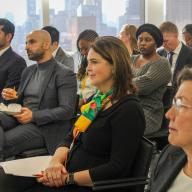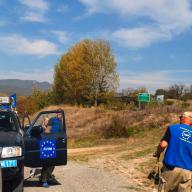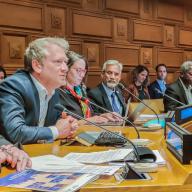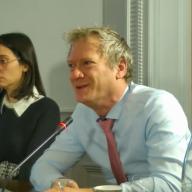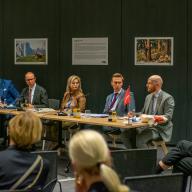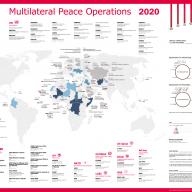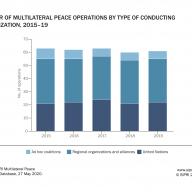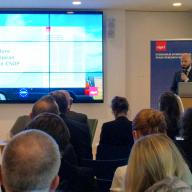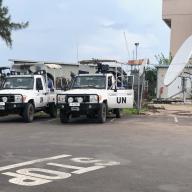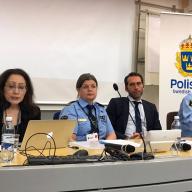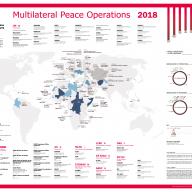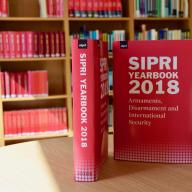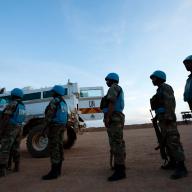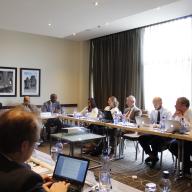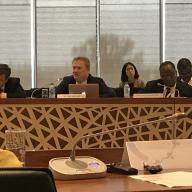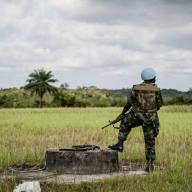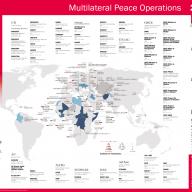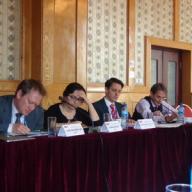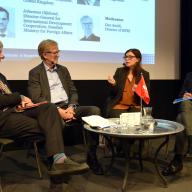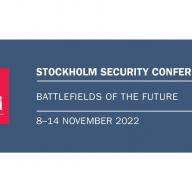On 8–9 April, SIPRI and the Friedrich-Ebert-Stiftung held a dialogue meeting in Dakar to kick off the new initiative ‘The New Geopolitics of Conflict Management: The Future of Conflict Management and Peace Operations.’
Related news: Peace operations and conflict management
SIPRI expert presents peacekeeping research at roundtable in New York
On 21 October, SIPRI research was used to inform a roundtable discussion on the United Nations Organization Stabilization Mission in the Democratic Republic of the Congo (MONUSCO).
New SIPRI research takes stock of the women, peace and security agenda
As the 24th anniversary of United Nations Security Council Resolution 1325 on women, peace and security (WPS) approaches, SIPRI is pleased to share its recent work on the WPS agenda.
SIPRI launches landmark report in New York
On 9 February, SIPRI launched a report that looks at how multilateral peace operations relate to non-traditional security challenges. The launch took place against the backdrop of discussions on United Nations initiatives such as the ‘New Agenda for Peace’, ‘Summit of the Future’ and ‘Pact for the Future’.
SIPRI launches new EU Civilian CSDP Compact report in Brussels
On 15 November, SIPRI held an event in Brussels to launch the report ‘New Compact, Renewed Impetus: Enhancing the EU’s Ability to Act Through its Civilian CSDP’.
SIPRI at the 2023 Munich Security Conference
SIPRI had an active presence and co-hosted several events during the 2023 Munich Security Conference, 17–19 February. Topics for discussion included the food–climate–security nexus, how the war in Ukraine could fuel global instability and the European Union civilian crisis management.
SIPRI holds discussions at 2024 Munich Security Conference
SIPRI attended and co-hosted two side events at this year’s Munich Security Conference, 16–18 February.
Diplomacy in crisis: Whatever happened to peacemaking?
On 17 February, SIPRI co-hosted a lunchtime roundtable with International Crisis Group to shed light on the changing landscape of international conflict resolution, the crisis of diplomacy and the obstacles to achieving sustainable peace.
SIPRI launches new EU Civilian CSDP Compact report in Brussels
On 15 November, SIPRI held a launch event for the new SIPRI Research Policy Paper ‘Delivering the Compact: Towards a More Capable and Gender-balanced EU Civilian CSDP’.
New video series: Towards a new civilian CSDP Compact
SIPRI is pleased to launch a new video series on perceptions of civilian crisis management and the efforts to strengthen the civilian Common Security and Defence Policy (CSDP) missions of the European Union (EU). The series features interviews with officials from EU member states and experts from the European Centre of Excellence for Civilian Crisis Management and other relevant European organizations.
SIPRI co-hosts event on improving the effectiveness of UN peace operations against climate-related impacts
As part of the 'Climate-related Peace and Security Risks' project, SIPRI co-hosted an expert round table on maintaining the operational resilience of peacekeeping operations in the face of climate-related disruptions. The event was held on 10 May in New York.
SIPRI hosts workshop on a new EU Civilian CSDP Compact
On 17–18 March 2022, SIPRI hosted an expert workshop titled ‘Towards a New Civilian CSDP Compact’. The workshop took place in a hybrid format in Stockholm and virtually.
SIPRI co-convenes dialogue meetings in Geneva on peace operations and non-traditional security challenges
On 22–25 November, SIPRI and the Friedrich-Ebert-Stiftung (FES) held two dialogue events as part of a series that seeks to enhance understanding of United Nations and non-UN multilateral peace operations and non-traditional security challenges.
SIPRI launches new report on the EU’s Civilian CSDP Compact at an event in Brussels
On 18 November, SIPRI held a launch event for the new Insights paper, ‘Strengthening EU Civilian Crisis Management: The Civilian CSDP Compact and Beyond’.
SIPRI co-hosts webinar on the impact of Covid-19 on peace operations
On 6 October, a webinar co-hosted by SIPRI and the United Nations Department of Peace Operations (UNDPO) explored the many impacts of Covid-19 on peace operations.
SIPRI releases new map of multilateral peace operations
SIPRI is pleased to release a new map showing all multilateral peace operations active as of May 2020.
Declining trends in multilateral peace operations continued in 2019; attention shifting towards the Middle East and North Africa–new SIPRI data
While the number of United Nations and non-UN multilateral peace operations increased slightly in 2019, the number of personnel deployed in them decreased, according to new data from the Stockholm International Peace Research Institute (SIPRI).
SIPRI hosts launch event on the Civilian CSDP Compact in Brussels
On 13 November, SIPRI held a launch event for two new Policy Briefs on the EU Civilian Common Security and Defence Policy (CSDP) Compact, which was established in November 2018.
The state preferred as justice and security provider over non-state and informal actors—new SIPRI/Cordaid study on CAR and DRC
In two days, on 14 November, the mandate of the United Nations Multidimensional Integrated Stabilization Mission in the Central African Republic (MINUSCA) will be renewed, as will the mandate of the United Nations Organization Stabilization Mission in the Democratic Republic of the Congo (MONUSCO), next month.
SIPRI co-hosts seminar on UN peace operations and the policing of organized crime
On 12 April, SIPRI, in cooperation with the Swedish Police Authority, organized a seminar discussion on ‘Policing Organized Crime in the Context of UN Peace Operations’.
SIPRI at Swedish Forum on Human Rights
On 17 November, Ambassador Jan Eliasson, Chair of the SIPRI Governing Board and Dr Marina Caparini, Senior Researcher in SIPRI’s Peace and Development Programme, participated at the Swedish Forum on Human Rights.
SIPRI releases map of multilateral peace operations in 2018
SIPRI is pleased to release a new map showing all multilateral peace operations active as of May 2018.
Modernization of nuclear weapons continues; number of peacekeepers declines: New SIPRI Yearbook out now
SIPRI today launches the findings of SIPRI Yearbook 2018, which assesses the current state of armaments, disarmament and international security.
New SIPRI report examines peace operations and the challenges of organized crime
As part of SIPRI’s new initiative looking at non-traditional security challenges posed to multilateral peace operations, SIPRI launches a new background paper exploring the role that peace operations play in preventing and combating organized crime, particularly in weak or collapsed states.
New SIPRI research on peace operations and non-traditional security challenges
SIPRI launched the third phase of the New Geopolitics of Peace Operations–which focuses on the role of peace operations in dealing with non-traditional security challenges–with the publication of the Background Paper, ‘Multilateral peace operations and the challenges of terrorism and violent extremism’, and the organization of a dialogue meeting on the same topic.
SIPRI researcher presents findings at the Dakar International Forum
Dr Jaïr van der Lijn, Head of the SIPRI Peace Operations and Conflict Management Programme, featured on a panel discussion on peacekeeping arrangements between intergovernmental organisations at the recent Dakar International Forum on Peace and Security in Africa, 13–14 November 2017.
SIPRI presents final report of the ‘New Geopolitics of Peace Operations II’ initiative
SIPRI presents the findings of the report African Directions: Towards an Equitable Partnership in Peace Operations.
SIPRI publishes new reports on African regional dialogues
As part of the second phase of the New Geopolitics of Peace Operations Initiative, SIPRI co-organized a series of dialogue meetings with diplomats, military representatives and academics in five subregions of Africa: West Africa (Abuja), the Greater Horn of Africa (Addis Ababa), Central Africa (Douala), Southern Africa (Maputo) and Sahel-Saharan Africa (Bamako).
Reports from each of the dialogue meetings are now available for download from the SIPRI website. Each report highlights several key themes that emerged from the regional dialogues.
New book on Peacebuilding and Friction released in March
SIPRI Senior Researcher Jair van der Lijn has coedited the book Peacebuilding and Friction. The book aims to understand the processes and outcomes that arise from frictional encounters in peacebuilding, when global and local forces meet.
SIPRI and PAX: Hope for peace in South Sudan, but fragmentation still a risk
According to the report Scenarios for South Sudan in 2020, released today by the Stockholm International Peace Research Institute (SIPRI) and Dutch peace organisation PAX, there is hope for a peaceful future in South Sudan if the 2015 peace agreement is implemented and the peace process opened up beyond the current parties. Otherwise, the human cost will likely be tremendous and the country might even risk complete fragmentation.
SIPRI’s New Geopolitics of Peace Operations project concludes a series of five regional dialogue meetings in Africa
On November 16-18, SIPRI organized a regional dialogue meeting in Bamako, Mali on the future of peace operations and conflict management in Northern Africa. This was the fifth and final regional meeting in the series organized within the project New Geopolitics of Peace Operations II: African Outlooks on Conflict Management. The project aims to better understand how to prepare peace operations for the diverse security environments in Africa, while promoting local and international dialogue on the future of peace and security.
UN peace operations have not become more dangerous, suggests new SIPRI report ahead of peacekeeping summit
A new report by the Stockholm International Peace Research Institute (SIPRI) on fatality trends in United Nations peace operations reveals that the rate of peacekeepers dying while in the service of the UN has steadily fallen over the past 25 years. The report, released to coincide with the summit on UN peacekeeping in New York, hosted later today by US President Barack Obama, provides a timely counterpoint to the popular perception that UN peace operations have become increasingly dangerous.
Nuclear force reductions and modernizations continue; peace operations increase—new SIPRI Yearbook out now
Stockholm International Peace Research Institute (SIPRI) today launches the findings of SIPRI Yearbook 2015, which assesses the current state of armaments, disarmament and international security. Key findings include: (1) all the nuclear weapon-possessing states are working to develop new nuclear weapon systems and/or upgrade their existing ones; and (2) the number of personnel deployed with peace operations worldwide continues to fall while the number of peace operations increases.
Final report from SIPRI’s New Geopolitics of Peace Operations Initiative now online
On 18 February 2015 the findings of the final report from SIPRI’s New Geopolitics of Peace Operations Initiative were launched at an event at the United Nations headquarters in New York City.
Success of future peace operations will depend on managing expectations, allocating resources and balancing states’ contributions, says SIPRI
A new report by Stockholm International Peace Research Institute (SIPRI) identifies clarifying expectations, aligning resources and equitable burden sharing as key components of successful future peace operations. The report, to be launched today in New York City, aims to feed into a larger United Nations review of its peace operations.
New SIPRI reports on regional peacekeeping dialogues out now
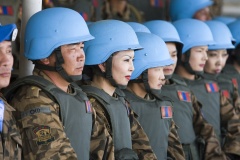 Researching peace operations in a multipolar world remains a challenge. Some argue that the shift of influence from established to emerging powers runs the risk of destabilizing international conflict management.
Researching peace operations in a multipolar world remains a challenge. Some argue that the shift of influence from established to emerging powers runs the risk of destabilizing international conflict management.
SIPRI researchers participate in regional dialogue meetings in Brussels and Hanoi
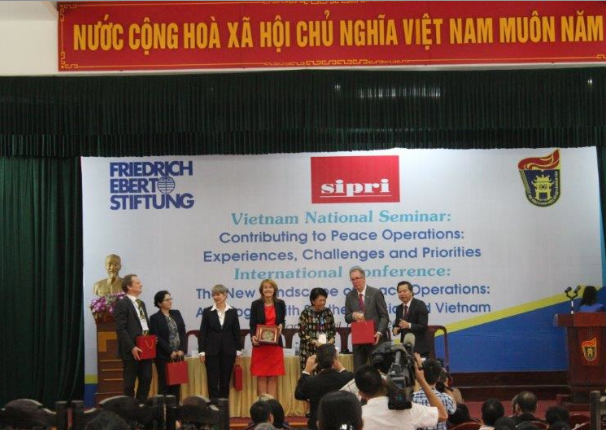
Image: Jaïr van der Lijn and Xenia Avezov (left) at the final regional dialogue meeting of the New Geopolitics of Peace Operations initiative in Hanoi, Viet Nam.
Earlier this month Dr Jair van der Lijn and Xenia Avezov of SIPRI's Armed Conflict and Conflict Management Programme delivered the final two regional dialogue meetings of the New Geopolitics of Peace Operations initiative in Brussels and Hanoi.
New Geopolitics of Peace Operations project holds regional dialogue meetings
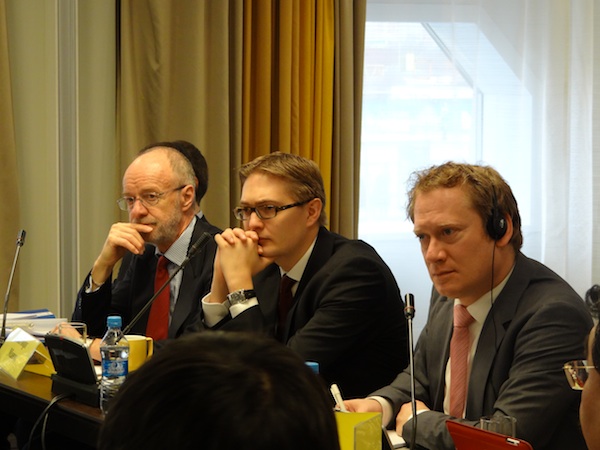
On 4–8 November Dr Jair van der Lijn (pictured, right) and Xenia Avezov of SIPRI's Armed Conflict and Conflict Management Programme attended the fourth set of regional dialogue meetings conducted as part of the New Geopolitics of Peace Operations: A Dialogue with Emerging Powers project.
Afghanistan needs civilian strategy, says SIPRI
Alongside the military exit strategy, the international community needs a civilian entry strategy for Afghanistan in which donors continue or even increase their development assistance after the military have left. Afghans’ desire for continuing basic services and a strong Afghan government are stressed in a new report by Stockholm International Peace Research Institute (SIPRI) presented today at a meeting of donors and civil society in Kabul.
Nuclear force reductions and modernizations continue; drop in peacekeeping troops; no progress in cluster munitions control—new SIPRI Yearbook out now
Stockholm International Peace Research Institute (SIPRI) today launches the findings of SIPRI Yearbook 2013, which assesses the current state of international security, armaments and disarmament. Key findings include: (a) alone among the five legally recognized nuclear weapon states, China expanded its nuclear arsenal in 2012; (b)the number of personnel deployed with peace operations worldwide is falling rapidly, due to the withdrawal from Afghanistan; and (c) progress towards a global ban on cluster munitions stalled in 2012.
SIPRI researchers attend regional dialogue meetings on peace operations
Dr Jaïr van der Lijn and Xenia Avezov of SIPRI's Armed Conflict and Conflict Management Programme attended the third regional dialogue meetings of the New Geopolitics of Peace Operations project, on 11–12 April in Ulan Bator, Mongolia.
Arab Spring redefines conflict; 'fewer but newer' nuclear weapons; peacekeeping numbers plateau—new SIPRI Yearbook out now
Key findings include:
- Upheavals in the Middle East and North Africa in 2011 highlighted the changing character of contemporary armed conflict
The changing nature of support to peacebuilding
The panel discussion addressed the key findings of the published ECDPM report Supporting Peacebuilding in Times of Change: A Synthesis of Four Case Studies, and brought together expertise from the ECDPM, SIPRI, the British Government’s Department for International Development and the Swedish Ministry for Foreign Affairs.
2022 Stockholm Security Conference
On 8–14 November, SIPRI will convene the seventh annual Stockholm Security Conference, this year under the heading of ‘Trends of Conflict and Warfare in the 21st Century: Effects and Impact of the War in Ukraine’.






